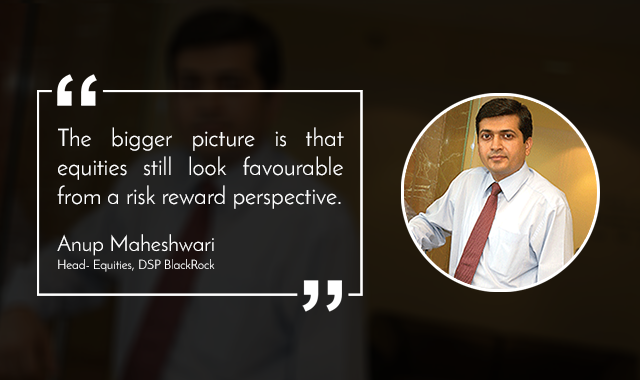
(Anup has been working with DSP BlackRock Investment Managers Pvt. Ltd. (previously called DSP Merrill Lynch Fund Managers) since July 1997, and has been managing the domestic funds since May 2001 to June 30, 2012. Anup was CIO at HSBC Asset Management between Dec 2005 and May 2006 before returning to DSP BlackRock Investment Managers. Between 1997 and 2000, Anup also managed an offshore fund, the Merrill Lynch India Fund which was registered in Mauritius and sold to Merrill Lynch’s clientele outside India. Prior to joining DSP BlackRock Investment Managers Pvt. Ltd., he worked with Chescor, a British fund management firm that managed three offshore funds investing into Indian equities. Anup obtained a Bachelor of Commerce degree from Sydenham College, Bombay University, in 1991 followed by a Post Graduate Diploma in Management (PGDM) from the Indian Institute of Management (IIM), Lucknow, in 1993.)
- Given that market indices are already at historically high 24+ PE ratio, is there a case for a more focused sector or thematic approach?
If one looks at large cap stocks in the index, they are not very expensive considering their long-term averages from a pure valuation perspective. As you go down the chain in market cap, stocks are looking more and more expensive but in the large cap space, there are still a lot of opportunities where valuations are quite reasonable, especially in the context of much lower and stable interest rates. Hence we still stay the course on the long term view on equities overall as an asset class. Minor corrections can keep happening but the bigger call and the bigger picture is that equities still look favourable from a risk-reward perspective.
- Which are the sectors could outperform, and what are the key drivers?
Overall, one of the underperforming sectors that we like right now is pharmaceuticals. The pharma sector has had a couple of tough years and we are hoping that will get sorted out gradually. We do not see FDA issues being prolonged.
Financial services have been a steady performer and that continues to be the largest weight in most portfolios. While as a space, the sector is expected to keep steadily performing, within it, it may be time to start looking at some of the wholesale banks in the private sector. That is an area that we are beginning to look at closely. They have been big underperformers for many years now. That could be an aspect to look at because over the next one year, we have reached a point where incremental asset deterioration would be very limited and over the next year hopefully a lot of further recognition will come through. Auto component companies could also be interesting and along with textiles, speciality chemicals and agro commodity stocks are some smaller sectors that what we feel could do well going forward.
- What is the outlook on the participation by FIIs vis-à-vis domestic investors?
We are beginning to see FII flows coming back to emerging markets as a category. There is no doubt about the fact that there is very large potential for domestic flows to come into equities but over the past few years we have seen a large part of those flows have actually been more focused on mid to smaller sized companies and not so much the largecaps. Given the way midcaps and small caps are priced at the moment, we feel domestic flows will start spreading out away from just mid and small caps into some largecap companies as well.
But flows are also a function of market performance. It is very important that the market keeps moving up for people to derive more comfort and keep allocating more but there is no denying the fact that over maybe 5-10-year period the ownership of Indian investors in the market should probably rise a lot more from where it is today.
- What are the triggers (upside / downside) to watch out for in the next one year? These could be global or India-specific factors
On the domestic front, corporate earnings (post demonetization) could be a trigger. Although earnings coming in higher than expected would be a positive surprise, the expectations are that it would be largely neutral. NPA resolution (over the next few quarters), windfall from the crackdown on black money and monsoons are other significant domestic triggers.
On the global front, ripple effects could be felt from measures taken by the US Fed, President Trump’s policies, elections in Europe, Middle East geopolitics, OPEC and its impact on crude. China related factors like overall economic growth there, currency outflows and strain on its banking system may also impact flows coming in from outside India
[tek_button button_text=”Download Fisdom App” button_link=”url:https%3A%2F%2Fbit.ly%2F38VKyy6||target:%20_blank|” button_position=”button-center”]



























